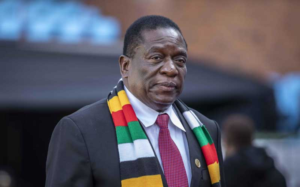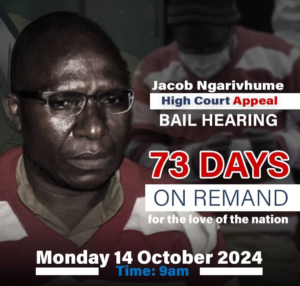ZIMBABWE’S PRESIDENTIAL SPOKESMAN EMBROILED IN EXPLOSIVE ELECTORAL CORRUPTION SCANDAL

In a dramatic unfolding of events, George Charamba, the spokesman for Zimbabwe’s President Emmerson Mnangagwa, is at the center of a corruption storm involving the Zimbabwe Electoral Commission (ZEC). The scandal, which has captured the nation’s attention, reveals a tangled web of fraud and venality, implicating high-ranking officials and prominent businessmen both locally and internationally.
The controversy first erupted when investigative reports exposed a tender scandal within the ZEC, hinting at deep-seated corruption within the electoral body. The revelations have not only discredited ZEC but also dragged the Office of the President and Cabinet into the mire. Central figures such as Martin Rushwaya, the Chief Secretary to the Cabinet, Isaac Moyo, Director-General of the Central Intelligence Organisation, and ZEC chairperson Priscilla Chigumba have been named in association with the scandal.
Local businessmen Wicknell Chivayo, Moses Mpofu, and Pedzisayi “Scott” Sakupwanya, along with South African businessmen Thomas Michel du Sart and Angus Carlaw, are also embroiled in the controversy. These revelations have shaken the political landscape of Zimbabwe, highlighting a crisis of governance and integrity at the highest levels of government.
Charamba, known for his aggressive defense of the administration and frequent clashes with journalists on social media platforms, has been especially vocal against The NewsHawks, the outlet that broke the story. He has been accused of using his platform to launch attacks against critics and mask the underlying issues plaguing the Mnangagwa administration.
Critics argue that Charamba’s conduct is unbecoming of a civil servant whose salary is funded by taxpayers. His vehement defense of the tainted electoral process and his attempts to discredit the media underscore a broader pattern of governance failures and corruption under President Mnangagwa’s leadership.
The depth of the scandal is significant, with accusations suggesting that the involved parties manipulated ZEC tender processes to award multimillion-dollar contracts to favored businessmen. This manipulation not only compromises the integrity of the electoral process but also diverts substantial public funds into private hands, undermining public trust in the government.
The scandal’s impact extends beyond the immediate political repercussions. It poses serious questions about the fairness and transparency of upcoming electoral processes in Zimbabwe. Citizens and opposition parties are increasingly concerned that the corruption within ZEC could influence electoral outcomes, thereby eroding democratic norms and further entrenching the current administration.
The international community has also taken notice, with calls for transparency and accountability. There is a growing demand for an independent investigation to ensure that those responsible are held accountable, and to restore integrity to Zimbabwe’s electoral commission.
Meanwhile, the government’s response has been tepid. While there has been some acknowledgment of the issues, critics demand more decisive action. They argue that without significant reforms and a genuine commitment to rooting out corruption, the cycle of mismanagement and graft will continue, with dire consequences for the nation’s political and economic stability.
As the scandal continues to unfold, the Zimbabwean public remains vigilant, and the international community watches closely. The outcomes of this controversy could have far-reaching implications for the stability, governance, and democratic progress of Zimbabwe. It remains to be seen how the Mnangagwa administration will navigate these turbulent waters, but what is clear is that the Zimbabwean people demand and deserve a transparent, accountable government.



